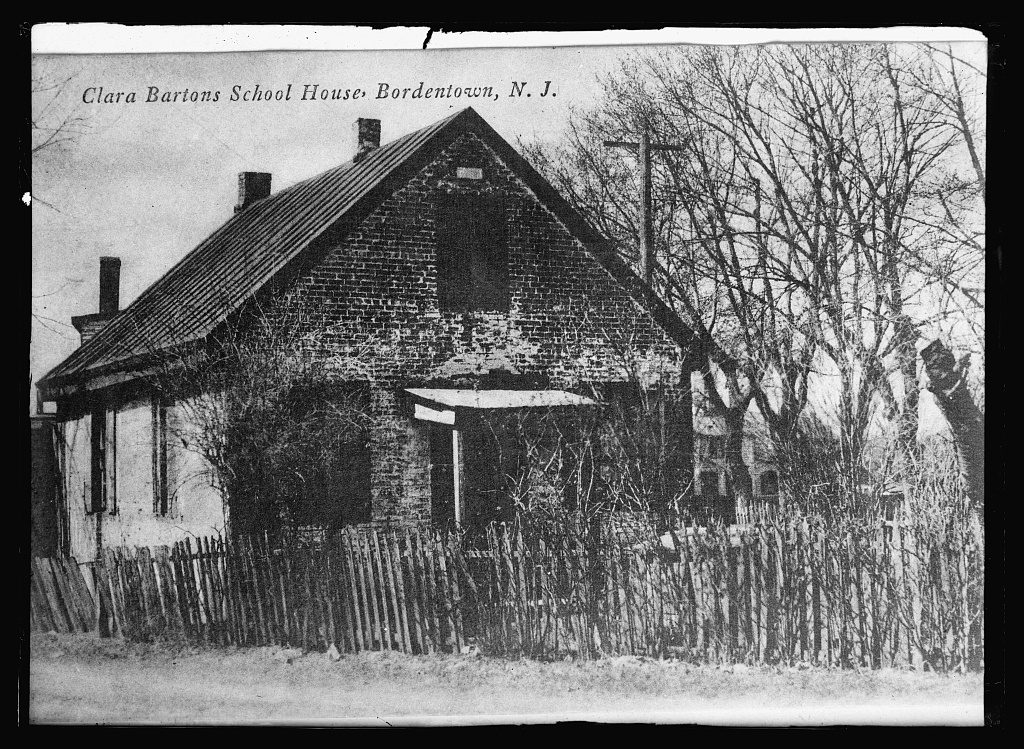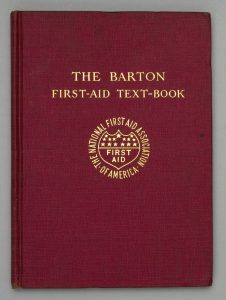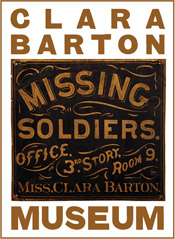Clara Barton – The Teacher Who Was Afraid of Public Speaking
Clara Barton is famous for her time as a Civil War nurse, heading the Missing Soldiers Office (as readers of this blog know), and founding the American Red Cross, but, ultimately, she was a teacher at heart.
Even though she became a prominent public figure, Clara Barton was actually quite timid as a child. Her parents were concerned about her shy disposition so they asked renowned phrenologist L.N. Fowler, to assess the best course of action for Clara. Fowler suggested Barton become a teacher to face her fears. So, much to her dismay, she began teaching in her hometown of North Oxford, Massachusetts at the age of 17. She proved to have a natural talent and taught there for 11 years.
In 1850, Barton, seeking a greater intellectual challenge, went to the Liberal Institute in Clinton, New York (one of only a few colleges in the country open to women). After getting her degree, she felt she couldn’t go back to her original school for fear of regressing in life.
Barton found her next mission in 1852, while visiting a friend in Bordentown, New Jersey. There, she saw the need for a free school for the poorer children of the town. While a few free public schools existed in New Jersey, they were very uncommon. The local school board was skeptical of her ability to teach what they considered to be incorrigible students, but she succeeded. Too well perhaps, because after two years she was supplanted from her position and replaced with a male principal. Barton’s passion for education prompted her to state that “I may sometimes be willing to teach for nothing but if paid at all, I shall never do a man’s work for less than a man’s pay.” Although often seen as a modern problem, Barton confronted sexism in the work place throughout her career. Her experience at the Bordentown school was one of the more notable ones.

Clara Barton’s school house in Bordentown, NJ c 1919. Courtesy of the Library of Congress
Barton’s teaching career was put on hold when she took a job at the U.S. Patent Office, making her one of the first women to work for the government. When the Civil War broke out in 1861, she famously acted as a nurse. Some of the very first patients she treated were men from the 6th Massachusetts who were injured in Baltimore on their way to Washington. Several of them were her former students, causing Barton to tearfully reflect, “They were faithful to me in their boyhood, and in their manhood faithful to their country.”
After volunteering throughout the Civil War and searching for missing Union soldiers after the guns fell silent, Barton returned to education – only this time she was educating the American public writ large. In the 1870s, Barton embarked on a public awareness campaign to build support for establishing the Red Cross in America. Barton understood that public backing of the Red Cross would be difficult unless she educated people on the subject, so she spent a good deal of time traveling the country and lecturing about humanitarian relief efforts in times of both peace and war. Many of her speeches were based on her experiences in the Civil War, but they often went beyond this narrative to enlighten the citizens about what they themselves could do to advance the principles of humanitarianism.

“The Barton First-Aid Textbook” 1906.
Courtesy of the Clara Barton National Historic Site/Glen Echo Park
Teaching first aid also became one of Barton’s passions in her later years. In 1905, a year after resigning as President of the American Red Cross, she formed the National First Aid Association of America. This new society was designed to teach the public how to assist in times of personal injury and localized emergencies. Barton was well suited to teach first aid, having administered it personally during the Civil War and witnessed it throughout Europe in the 1870’s. Barton later wrote, “From familiar observation of the methods of first aid in other countries during the last 10 or 15 years, it has been my most earnest desire to see it instituted in America, and it is very gratifying to feel that several of the most efficient First Aid societies of today were of my recommendation and desire.”
In Barton’s time, teaching the public to perform emergency first aid did not apply to the work done by the Red Cross. Barton was so successful in her venture with the National First Aid Association of America, the Red Cross added first aid to their scope. In that way, the Clara Barton’s teachings still impact our world today.
Tags: American Red Cross, Bordentown, Clara Barton, First aid, Free public school, National First Aid Association of America, NJ, teaching Posted in: Clara Barton: American Legend

